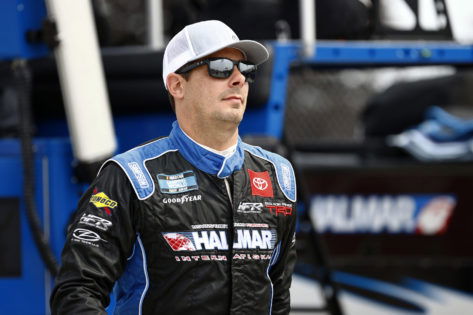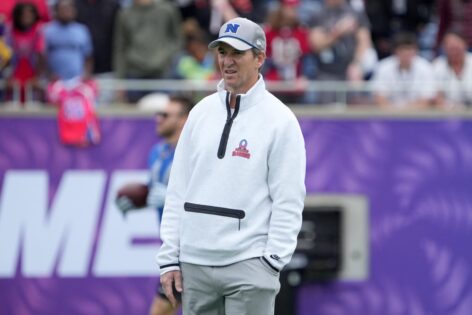Stewart Friesen’s nightmare week just got worse. Days after his hospitalization, Friesen has now faced another blow: the National Motorsports Appeals Panel has upheld his disqualification (DQ) from the Indianapolis Raceway Park (IRP) race earlier that week. NASCAR has determined that Friesen’s truck failed the post-race inspection due to a front ride height violation. The appeals panel cited Rule 14.17.3.2.1.2.A, affirming that a part failure, whether intentional or not, resulted in the failure of the front ride height.
On July 28, the NASCAR Craftsman Truck Series driver was injured in a dirt‑modified crash at the Super DIRTcar Series King of the North event at Autodrome Drummond in Quebec, Canada. Friesen, who was locked into the Truck Series playoffs thanks to a June 7 win at Michigan, suffered an unstable open‑book pelvic fracture (pelvis broken in multiple places with a large hematoma) and a fractured right leg, both requiring surgery. CT scans confirmed no head, neck, or spine injuries, and he remained alert and communicative as he was extracted from burning wreckage on lap 17, later being transferred to the hospital for evaluation.
Stewart Friesen DQ from IRP is upheld by appeals panel. Panel: “The panel agrees that the team violated Rule 14.17.3.2.1.2.A. There was a part failure that is not known if it was intentional or unintentional, resulting in failure of front ride height.”
— Bob Pockrass (@bobpockrass) July 30, 2025
Friesen is no stranger to the Truck Series spotlight. A playoff contender with a win this season and known for his aggressive, dirt-track-influenced style, he’s been one of the more consistent independents in the series. His IRP run initially added to that resume until the penalty erased his finish and stripped valuable points, right as he was heading into recovery mode from injury.
For many fans, this wasn’t about a technical rule; it was about timing, empathy, and the appearance of fairness. While the appeals panel focused strictly on the rulebook, fans have zeroed in on the broader optics. A hospitalized driver, a failed part without clear intent, and a DQ that stands — it’s the kind of situation that sparks emotional responses across the racing community.
Fan backlash questions NASCAR’s decision
The disqualification decision was first reported by Fox Sports’ Bob Pockrass on X, who shared that the National Motorsports Appeals Panel upheld Stewart Friesen’s IRP penalty. The decision to uphold Stewart Friesen’s disqualification came just two days after news of his brutal injury at Auto drome. Pics of him getting carried out on a stretcher were still fresh among the fans. And those who followed the horrifying wreck questioned the timing of the appeals panel’s decision. “Talk about kicking a man while he’s laid up with a broken pelvis and leg,” one fan posted, summing up the overwhelming sentiment online.
While the appeals panel was simply ruling on a pre-scheduled matter, the timing couldn’t have been worse for public optics. Fans often expect some form of grace or consideration when drivers are injured, not a bureaucratic decision delivered mid-recovery. Historically, NASCAR has rarely shown leniency due to off-track factors, but this incident may reignite calls for more human-centered timing in penalty announcements.
Many fans aren’t arguing the technical merits of the disqualification itself, but they’re stunned at how it amplified Friesen’s already miserable week. He was knocked out of his truck, his playoff momentum derailed, and now his IRP result has been stripped as he recovers from serious injuries. “They actually added insult to injury,” one user wrote, reacting to the upheld penalty. It’s rare to see a driver go through a violent wreck and lose a race finish in the same week.
The brutal nature of Friesen’s crash, a fiery, airborne wreck with a multi-car pileup at Drummond, already had fans shaken. Pair that with a DQ and playoff uncertainty, and many fans felt the sheer amount of bad news was overwhelming. “Dude having a rough week and it’s only Wednesday,” one fan commented under the ruling post, summarizing the general disbelief.
This framing isn’t new in motorsports: drivers can fall victim to compounding misfortunes, but fans often rally behind them in such stretches. In Friesen’s case, the support reflects how fans view him, a hard-nosed dirt racer who’s never had the full factory backing of powerhouse teams. When someone like that gets crushed by both machinery and governance, the emotional support floods in.
Though the appeals panel said there was no proof that the part failure was intentional or not, the DQ still stood. To many fans, that read like a guilty verdict handed to a man who couldn’t even defend himself in person due to his hospitalization. “Bro’s hospitalized and they still call him guilty,” one user remarked, frustrated by the panel’s phrasing and lack of discretion.
NASCAR’s rules are rigid when it comes to post-race inspection, especially concerning minimum ride height. But the phrase “not known if it was intentional or unintentional” left a bitter taste for fans, especially since teams don’t always control part failures. This reaction highlights a growing debate: should enforcement treat ambiguous cases with more nuance, especially when there’s no clear gain or intent?
Beyond legality, what fans seemed to want most was humanity, a ruling that gave Friesen a moral win, if not a competitive one. Even fans who agreed the part broke saw a chance for NASCAR to show some grace. “Man’s laid up in the hospital and they couldn’t even overturn the DQ to make him smile a lil bit,” a fan joked, masking frustration in humor. Fans didn’t expect a reversal based on sympathy alone, but many hoped NASCAR would issue a statement showing support or delay the ruling. Instead, the cold tone of the panel’s decision clashed with the driver’s real-time suffering, a dissonance fans were quick to call out.
The upheld disqualification of Stewart Friesen might follow NASCAR’s rulebook, but to fans, it struck a nerve deeper than a technical violation. After a terrifying crash left him hospitalized with severe injuries, many expected the sport to show restraint or delay its judgment. Instead, the timing and tone of the ruling made it feel like bureaucracy won over compassion. In an era where public sentiment moves fast, NASCAR may find itself under increasing pressure not just to enforce fairly, but to do so with empathy when the stakes are more than just mechanical.
The post Fan Outrage Erupts as NASCAR’s Penalty Rubs Salt in Wounds of Hospitalized Driver appeared first on EssentiallySports.



